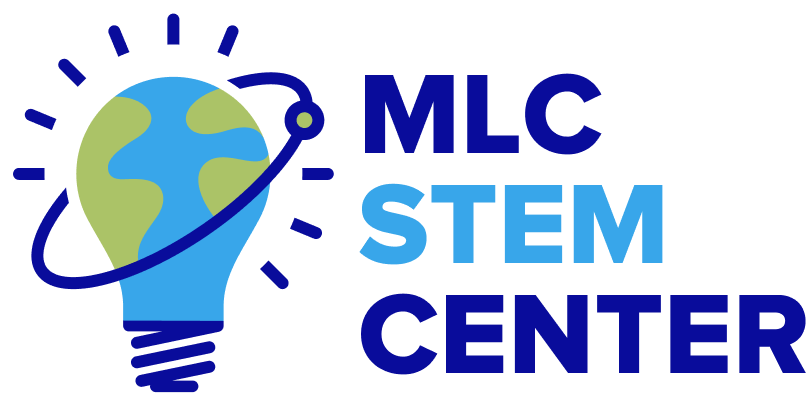Activities
Contact UsOur STEM Programs
Our STEM, STEAM, and Engineering classes invite children to learn by doing. Kids build roller coasters and bridges, launch rockets, solve science mysteries, and discover how energy, weather, money, and the human body work—all through hands-on projects and guided challenges. Grades 1+.
Maker Lab
Discover robotics and hands-on building! Kids use simple machines, motors, and tools to build, test, and problem-solve through guided projects. Ages 6–11.
Code Academy
Code the future! Kids learn essential digital skills through fun projects like game design, app development, and coding basics. Build confidence and prepare for tomorrow. Ages 6 to 11.
Little Engineers
Spark a love for STEM early! Playful, hands-on learning for little ones. Ages 3 to 5. Explore science, engineering, and math through engaging activities and games.
What is STEM?
Science
Technology
Engineering
Mathematics
Little Engineers
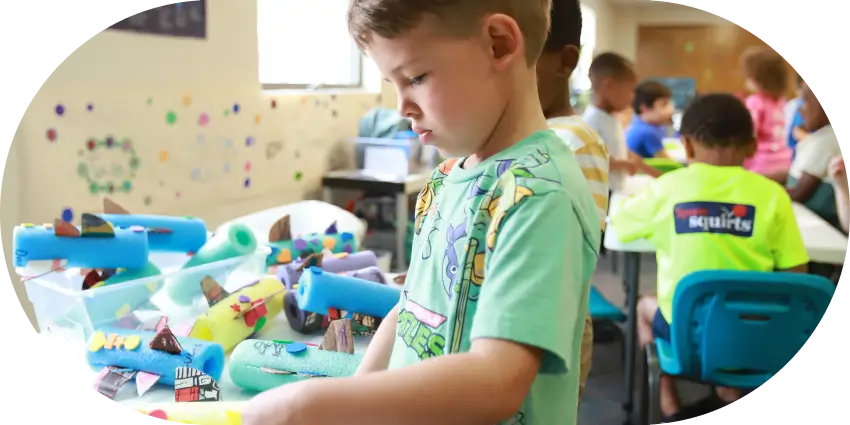
Little Engineers (Ages 3-5): Budding Scientists and Builders Start Here!
Is your child a natural explorer? Our Little Engineers program is designed to spark curiosity and a lifelong love of STEM in children aged 3 to 5, through exciting hands-on activities and playful exploration. Each week brings a new theme and a world of discovery!
Imagine your little one digging for fossils in our Jurassic Exploration week, learning about dinosaurs and ancient creatures. Or perhaps they’ll be fascinated by our Nature Science theme, exploring plants, insects, and weather through fun experiments. We might even blast off into space during Journey to Space week, building rockets and investigating the stars.
Our activities are carefully crafted to introduce STEM concepts in an engaging and age-appropriate way. From building bridges like Bob the Builder to exploring the science behind food in Kitchen Science, our little engineers are always learning through play. We’ll mix up Amazing Potions, learn about forces and motion in Speed, Force and Fun, and discover the magic of building in Three Little Pigs.
At Little Engineers, we nurture creativity, problem-solving, and critical thinking skills while fostering a love of learning. Join us for a fun-filled adventure where every day is a new opportunity to explore, discover, and grow!
Code Academy
Our Code Academy track is designed to expose students to both the study and use of computer science. Students can learn about programming, video game design and 3D Video Gamemaker, app development, digital arts and 3D design/3D Printing. We provide laptops for the students in these programs. Our Code Academy program is for students who love to create and develop their digitall skills in the following classes:
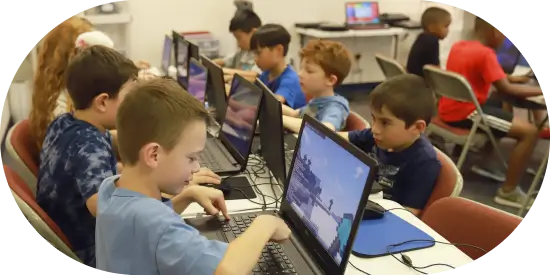
Coding
Students learn the basics of programming at their own pace as they are introduced to MIT’s Scratch, which is designed specifically for ease of use by children, employs click-and-drag colored command blocks to program simple animations and games. Each week there are separate sections for new and returning students with different exercises and projects.Entering Grades 1 and up in the Fall.
Digital Arts
Students will explore different digital arts techniques while using their creativity in a fun way: Using amazing brushes and symmetry, students will sketch and draw beautiful artworks. Students will create short animations. Students will learn to alter images to create surreal effects. Each week there are separate sections for new and returning students with different exercises and projects. Entering Grades 2 and up in the Fall.
Roblox Lab Design
Students will take their video design to the next level by designing their own video game in Roblox. Students will use basic game design principles and their creativity to craft their unique games: from obstacle course to adventure game or racing game, the options are limitless!
Video Game Design
Students are introduced to video game design where they will combine their creativity, storytelling skills with coding and strategy in order to create their world and characters create original games that are fun to play, not too easy to win, not too hard to lose and pleasing to the eyes. Returning students can continue to build upon their existing games or embark on new projects. Entering Grades 1 and up in the Fall.
App Development
Students progress from users to actual builders of their own fully functional apps. In our course, we use MIT App Inventor and other user-friendly software to introduce students to app development. MIT App Inventor employs a simple click-and-drag programming language that lets students develop and export various software projects as applications on different Android platforms. Because it uses a similar programming architecture, our App Development course is an excellent sequel or complement to our Scratch course. Each week there are separate sections for new and returning students with different exercises and projects. Entering Grades 2 and up in the Fall.
3D Design/3D printing
Students experience the fun of creating 3D designs using a modeling software. Students push and pull surfaces to turn them into 3D forms. They then can stretch, copy, rotate, and paint these forms to create their own customized structures. These structures can range from buildings to various forms of transportation. Students also are exposed to 3D printing technology through use of our 3D printer. The kids will bring a small object home. Each week there are separate sections for new and returning students with different exercises and projects. Entering Grades 2 and up in the Fall.
AI Coding for Kids
Students are introduced to AI through hands-on activities using predictive data models. Students will practice making their own predictions and learn about data categorization and sorting while building programs with MIT’s Scratch. *Each week there are separate sections for new and returning students with different exercises and projects.*
Entering Grades 2 and up in the Fall.
Minecraft Mania
Minecraft is a widely popular 3D video game that lets users explore, construct, create, and interact inside an open and changeable virtual world. Each week’s instruction introduces a new world or civilization, with different missions, quests, or challenges. These tasks encourage students to learn, to think strategically, and to work together to accomplish their goals.
Students do not need a Minecraft account as we use a proprietary curriculum where kids access Minecraft using our accounts and explore and learn in our networked server.
Advanced students may have the opportunity to create their own world or explore Redstone.
Each week there are separate sections for new and returning students with different projects.
Minecraft Mania! – entering Grades 1 and up in the Fall.
Maker Labs
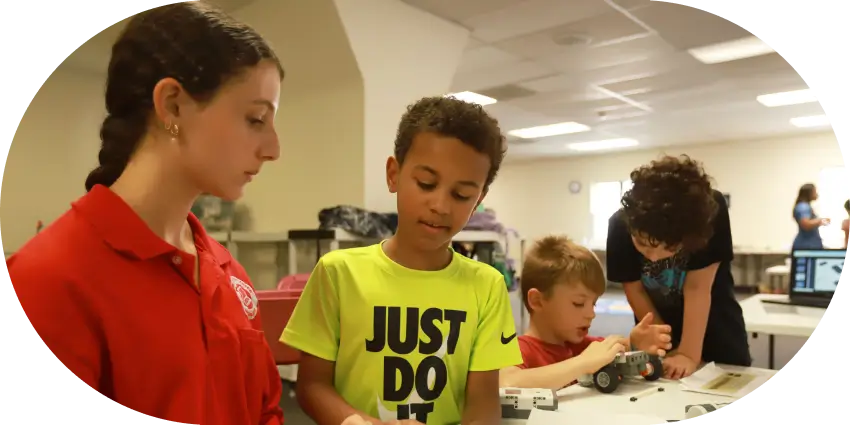
Robotics
Students are introduced to the basics of robotics while working hands-on with various Lego® robotic systems, including Wedo, Mindstorms, Mindstorms NXT, and EV3. Students design and construct different robots and then program them to move, react, and solve various challenges. Each week there are separate Beginner, Intermediate, and Advanced sections for new and returning students. Entering Grades 1 and up in the Fall.
Tinker Lab
In our Tinker Lab, our students will explore how things work by building, taking apart, and creating with everyday materials. They might design a marble run, build a small machine with gears and motors, create a bridge from recycled materials, or invent a toy that moves. Through hands-on experimentation, kids learn problem-solving, creativity, and confidence in a fun, guided environment.
STEM/STEAM/Engineering
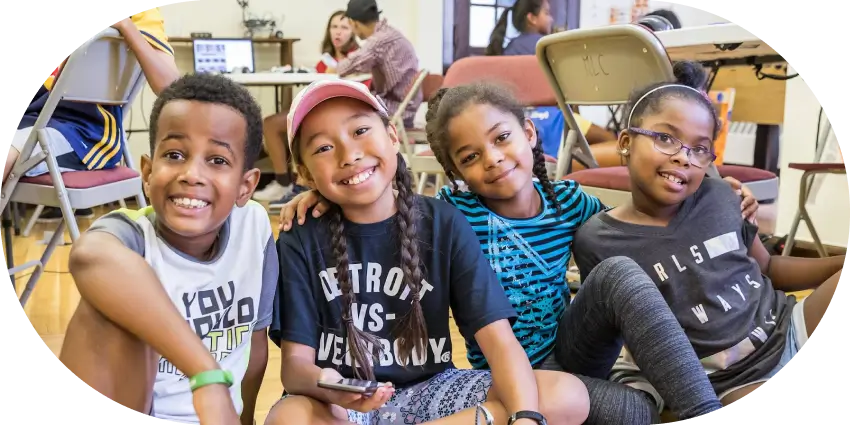
Pokemon STEM
Have fun with Pokemon while developing STEM skills, they design their own PokeBall and Pokemon characters, and improve your logic, critical thinking and strategy with game and cards
Entering Grades 1 and up in the Fall.
SPA Science
Make SPA products and understand the science behind them: fizzy bath bombs, sugary scrubs, aromatic bath salts, soaps and more. Students entering Grades 1 and up in the Fall.
Mechanical Engineering: Roller Coaster Engineering
Our teams of mechanical engineers will apply basics of physics principles (Newton’s laws, force, energy, gravity, speed, friction) as they use the engineering design process to design and build their own roller coaster. Entering Grades 1 and up in the Fall.
Environmental Engineering
Students will learn about environmental engineering and renewable energy through fun and engaging hands-on projects such as using the engineering design process to design and build innovative machines powered by the sun, the wind or water and engineer an oil spill cleanup solution. Entering Grades 1 and up in the Fall.
Bayblade Lab
Have fun with beyblades through hands on experiments while learning the basics of physics: momentum, inertia, friction and more. You will design your own beyblade and have time to battle your friends.
Entering Grades 1 and up in the Fall.
Architecture & Design
You are the architect and designer! You will create the blueprint of your dream house, skyscraper or city, then design it in 3D online, before building and decorating it. You will use engineering skills to add some electricity in your creation.
Entering Grades 1 and up in the Fall.
CSI STEM
You are the detective! Use your problem solving skills and explore forensic science to solve a mystery. Students will have fun engaging in the following activities: hands-on science experiments to analyze fingerprints, DNA and clues using chromatography, fiber analysis, chemistry and toxicology to identify unknown substances and liquids. Entering Grades 1 and up in the Fall.
Doctor’s Academy
Explore the science behind cells, organs, muscles and bones through fun, hands-on activities. From understanding how an apple turns into energy and experimenting with model cells, organs, muscles, brain and skeleton. Students will make their own stethoscopes or a prosthetic arm. Entering Grades 1 and up in the Fall.
Aerospace Engineering: Rocketry
3, 2, 1…Blast Off! Students will shoot for the moon this Summer applying basic physics concepts (angles, trajectory, aerodynamics, thrust, Newton’s Laws) and the engineering design process in hands-on projects such as designing, building and launching their own rockets. Entering Grades 1 and up in the Fall.
Money $mart: Financial Literacy for Kids
What is money? How do we earn it and save it? Difference between wants and needs. Students will build foundation of financial literacy through fun hands-on activities and games.
Magic Tree House STEM
Come join Jack and Annie as they are whisked away in their backyard tree house to countries around the globe and beyond! Each day, campers will explore STEM challenges packed with adventure , discovery, and fun facts about the places they visit
Harry Potter STEM
Calling all muggles to the Wonderful World of Wizardry. Design and build your blinking own magic wand, catapult to launch snitches, and mix up potions.
Entering Grades 1 and up in the Fall.
Kitchen Chemistry
Understand the chemistry behind food and cooking through hands-on projects and fun experiments. We will create delicious treats and amazing chemical reactions while learning about atoms, molecules and designing structure models.Entering Grades 1 and up in the Fall
Civil Engineering:
Designing & Building Bridges
Team of students will learn about different types of bridges and Civil Engineering through a realistic, hands-on problem solving experience. Using the Engineering Design Process and STEM skills, students will design a bridge on a software, then build it and test it. The bridge will have to meet load, safety and budget constraints. Entering Grades 1 and up in the Fall.
Electrical Engineering
Students learn the basics of electronics while conducting hands-on experiments with different educational kits:. Student can build exciting and challenging projects as AM radios, alarms, musical instruments, remote-controlled cars and more. Entering Grades 1 and up in the Fall.
Weather Science
Students will learn about weather science through hands-on projects such as creating weather instruments like a rain gauge or a anemometers and conducting science experiments with phenomena like snow and storms. Students will learn about the water cycle, and understand the science behind weather events such a tornado. The students will learn to record and graph weather data, act as weather observers, and use tools to analyze weather patterns.
Nature & Animal STEM
Students will engage in hands-on projects such as making model habitats, creating terrariums, and performing science experiments related to animal behavior and adaptations in different ecosystems.
Minecraft Mania
Minecraft is a widely popular 3D video game that lets users explore, construct, create, and interact inside an open and changeable virtual world. Each week’s instruction introduces a new world or civilization, with different missions, quests, or challenges. These tasks encourage students to learn, to think strategically, and to work together to accomplish their goals.

